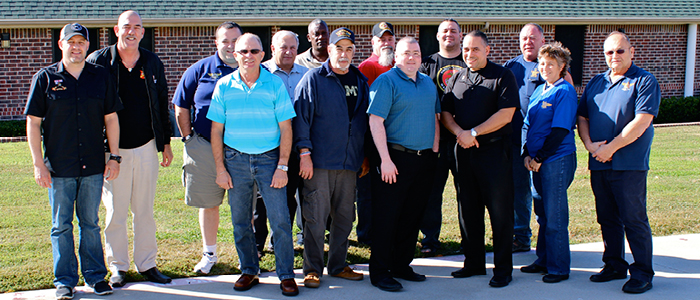Published 19 Nov, 2013

In midsummer of 2012, ATD Veterans Committee Recording Secretary Pete Meyer got a call from Local 501 Treasurer Angelo Cucuzza. The son of a Local 501 member, who had just finished boot camp, used the wrong classification of flight pass on his last trip home before being deployed. The member, who had worked at the American Airlines cargo facility at JFK for 27 years, had been terminated pending arbitration. Management argued that the member had violated flight policy by allowing his son to use a higher level of travel classification than he was allowed as a military serviceman — the classification he used was reserved for the children of employees attending college.
“It was completely unpatriotic,” said Pete, who also serves as the Veterans Committee representative for the New York area. “A child’s military status meant nothing to American Airlines. Why can you have a dependent child who is in college travel with one type of flight pass, but meanwhile we have a military member who is the same age who wants to come back to visit mom and dad at home — why can’t you give them the same privileges as college kids?”
When you travel standby at American Airlines, you do it by rank. Children of employees who are college students travel in the second-tier rank, after only the member themselves. Children who are on active military duty are in the third tier.
The airline’s flight policy for children of employees who are on active military duty had caused headaches before. Last year, a Local 562 member’s active duty son ended up spending two days of his leave period between tours at the airport waiting to get a third-tier standby seat on a flight home. After nearly 48 hours, the member decided that it just wasn’t worth it to for his son to spend another night sleeping in an airport terminal as his leave time ticked by — so he gave up on American Airlines and booked a seat for his son on another airline.
“How come a kid in college can come home whenever they want — Thanksgiving, Christmas, spring break,” said Pete. “But a poor guy in the military can’t even get a seat on the plane because he’s flying D3 [third tier]?”
The situation at Local 501 was the last straw. “The flight policy was outdated and antiquated and needed to change,” said Angelo. “Pete Meyer did everything in his power to convince the manager at JFK to save the employee’s job. While the employee violated the rule, the rule was wrong. American Airlines claims to go above and beyond for active military duty members and veterans, so the policy just didn’t make sense.”
After around-the-clock pressure from the union and the Veterans Committee, the manager conceded and the member was brought back to work less than a week before his case would have gone to arbitration. “The manager agreed at the 11th hour to bring him back. We actually paid for the arbitration; that’s how close we were. It was a last-minute deal. Pete went down with the member and then went down on his own the next day to hammer home his point.”
But the Veterans Committee didn’t stop there. At their August meeting, Committee Chairman Hank Trujillo handed management representatives a copy of a letter requesting that the policy be changed. “We basically explained to headquarters that this policy of not allowing dependents who are in the military to travel unless they are D3 is outdated,” said Pete. “Our Chairman remembered seeing that same travel rule in the employee handbook he was given after being hired at American Airlines. These rules were probably in effect since before the Korean War. “
Although management agreed with the Veterans Committee that dependents in the military should be able to travel in D2, they said that American Airlines wouldn’t be able to start on a policy change until after the merger with US Airways. The Committee held firm, stating that with the holiday season coming up, the policy change was more important now than at any other time of the year and that military servicemen and their families just couldn’t wait.
On November 5, American Airlines sent out a special communication on their Jetwire system. The alert announced a company-wide policy change: All dependents under 24 years of age will be able to travel in the second-tier classification, whether in the military, the Peace Corps, or any other occupation or course of study.
“American Airlines would never publically acknowledge the behind-the-scenes work that the Veterans Committee did to change the policy,” said Angelo. “But I know personally that it was due to their persistence. Everything usually moves at a snail’s pace, and these guys on the Veterans Committee did a lot of good work. They kept it moving, and that policy change benefited the entire ATD Division.”
“Management agreed to this change on the travel policy because we worked together,” said Pete. “The Veterans Committee recognized the disparity and brought it to the company’s attention and they fixed it. Moving forward, we’d like to continue making sure that we get done what needs to be done for our men and women in uniform in partnership and agreement with management.”
“After all,” said Pete. “Many of us have a family member that has served or is presently serving our nation’s military. We are still at war. This is the longest war the United States of America has ever been in, and more dependants will be taking the solemn Oath of Enlistment and the solemn Oath of Office”.
